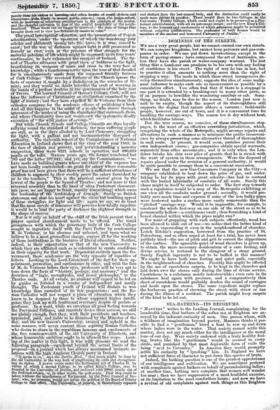DOMINION OF THE ST/WM, WI4 are a -very great people,
but we cannotmontrolbur.own streets. We can conquer kingdoms, but cannot keep paviount and gas-corn- ponies in order. We can put down insurrections, except in the form of• paving-stones ; have compassed the art of :barricades, un- less they • have the parish or water-company 'warrant. The last thing that a Londoner can proclaim to be his anal with any feeling of confidence is his street. The right of way he has in "law, but in practice it often amounts to nothing more than the right of stopping a way. The mode in which these street insurgencies de- velop themselves simultaneously, suggests the idea of some malig- nant influence to make each one as inconvenient as possible by a cumulative effect. You often find that if there is a stoppage in one part it is attended by a breaking-out in: .many other parts, as
• if on' purpose to bewilder the wandering omnibus' or cab. Some- -thing, no doubt, may be due to the season. i !London just now is said to be empty, though the aspect of its 'thoroughfares still stipports the dogma that nature abhors a VACUUM : ' fashionable peOple, however, are out of town, and it is a 'Convenient time for handling the carriage-ways. The season too is dry without heat, which'faeilitates labour.
• But the true reason, we conceive, of these simidtaneous stop- pages, is the want of an effective overridingljUrisdietion, which, tbmprising the whole of the Metropolis, might arrange repairs and "alterations in such a manner as to minimize the' public inconveni- ence by always preserving some alternatiVe thread of thoroughfare In each route. At present, it would Bean,' parishes pursue their own independent course; gas-companies obtain special warrants,
• separately from other movements ; and it is only when the Lon- doner breaks hie shin over piles of granite that he is struck with the want of system in thesements.' Were the disposal of
repairs placed under the revision general authority, it would be quite possible to arrange them in a convenient succession. We see that the new Gas-Consumers Company in the City—a company established to beat down the pr-ice ' of gas, and under- taking to lay its pipes with great celerity—has had to contend with the- buried labyrinths of conduits of all sorts. Surely this chaos might in itself be subjected to order. The first step towards such a regulation would be a map of the Metropolis exhibiting at one view all the conduits under ground ; secondly, it would pro- bably save much time and expense if some of the less bulky pipes were bestowed under a surface more easily removeable than the "pitched" carriage-way. Would it be impossible, for example' to construct the whole foot-way on one side of the street so as to be permanently hollow—a continuous vault ; thus 'furnishing a kind of boxed channel within which the pipes might rtui ? For want of grappling with such subjects effectively, wood has been allowed to slide out of use—we notice that the better kind of grants is superseding it even in the neighbourhood of churches.
itch Ritchie's suggestion, borrowed from the practice of St. Petersburg, and so often urged at least for a trial, has never been publicly tried—the use of pitch and grit to correct the slipperiness of the surface. The agreeable quiet of wood therefore is given up, to obtain the more necessary desideratum Of a sure footing, and divine service is restored to the clangour of a stony ground. Surely English ingenuity is not to be baffled in this manner? We ought to have both stun footing and Auiet path, especially in the neighbourhood of churches. Possibly this might be effected by the . use of caoutchouc carpets, to be kept in the churches and laid down over the stones only during the time of divine service. Caoutehoue is a. substance nearly indestructible; even cuts in its substance heal again with pressure, and a .comparatively thin sheet of caoutehouo would probably deaden the sound of carriages and hoofs upon the stones. The same expedient might replace the barbarous practice of strewing the street with straw or tan during the illness of a resident. The parish might keep carpets of the kind to be let out.


























 Previous page
Previous page